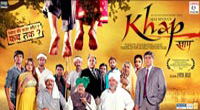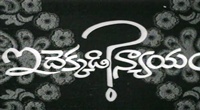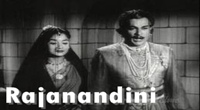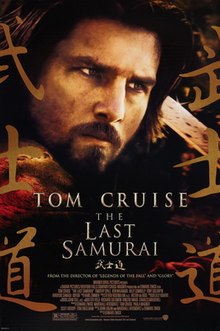The Last Samurai is a 2003 American period drama war film directed and co-produced by Edward Zwick, who also co-wrote the screenplay with John Logan and Marshall Herskovitz. The film stars Tom Cruise, who also co-produced, with Timothy Spall, Ken Watanabe, Billy Connolly, Tony Goldwyn, Hiroyuki Sanada, Koyuki, and Shin Koyamada in supporting roles.
| The Last Samurai | |
|---|---|
Theatrical release poster | |
| Directed by | Edward Zwick |
| Produced by |
|
| Screenplay by |
|
| Story by | John Logan |
| Starring |
|
| Music by | Hans Zimmer |
| Cinematography | John Toll |
| Edited by |
|
Production companies |
|
| Distributed by | Warner Bros. |
Release date |
|
Running time | 154 minutes |
| Country | United States |
| Language |
|
| Budget | $140 million |
| Box office | $456.8 million |
Tom Cruise portrays a United States Captain of the 7th Cavalry Regiment, whose personal and emotional conflicts bring him into contact with samurai warriors in the wake of the Meiji Restoration in 19th Century Japan. The film's plot was inspired by the 1877 Satsuma Rebellion led by Saig? Takamori, and the westernization of Japan by foreign powers, though in the film the United States is portrayed as the primary force behind the push for westernization. To a lesser extent it is also influenced by the stories of Jules Brunet, a French army captain who fought alongside Enomoto Takeaki in the earlier Boshin War and Frederick Townsend Ward, an American mercenary who helped Westernize the Chinese army by forming the Ever Victorious Army.
The Last Samurai grossed a total of $456 million at the box office and was well received upon its release, receiving praise for the acting, writing, directing, score, visuals, costumes and messages. It was nominated for several awards, including four Academy Awards, three Golden Globe Awards, and two National Board of Review Awards.
Screenplay
Former US Army Captain Nathan Algren, a bitter alcoholic traumatized by the atrocities he committed during the American Indian Wars, is approached by his former commanding officer Colonel Bagley to train the newly created Imperial Japanese Army for a forward-thinking Japanese businessman Omura, who intends to use the army to suppress a samurai-headed rebellion against Japan's new Emperor. Despite his hatred of Bagley for his role in the Indian Wars, an impoverished Algren takes the job for the money, and is accompanied to Japan by his old friend, Sergeant Zebulon Gant. Upon arriving, Algren meets Simon Graham, a British translator knowledgeable about the Samurai.
Algren finds the Imperial soldiers are actually conscripted peasants that have no knowledge of firearms or battle. Early in their training, Algren is informed that the Samurai are attacking one of Omura's railroads; Omura sends the army there, despite Algren's protests that they are not ready. The battle is a disaster; the conscripts are routed and Gant is killed. Algren fights to the last before he is surrounded; expecting to die, he is taken prisoner when Samurai leader Katsumoto decides to spare him. Algren is taken to Katsumoto's village to live among his family. While he is poorly treated at first, he eventually gains the Samurai's respect and actually becomes friends with Katsumoto. Algren overcomes his alcoholism and guilt, and learns the Japanese language and culture. He develops sympathy for the Samurai, who are upset that the pace of spread of modern technology has eroded the traditions of their society. Algren and Taka, Katsumoto's sister and the widow of a Samurai Algren killed, develop an unspoken affection for each other.
One night, a group of ninja infiltrate the village and attempt to assassinate Katsumoto. Algren saves Katsumoto's life, and then helps defend the village. Katsumoto requests a meeting with Emperor Meiji and is given safe passage to Tokyo. He brings Algren, intending to release him. Upon arriving in Tokyo, Algren finds the Imperial Army is now a well-trained and fully equipped fighting force. Katsumoto, to his dismay, discovers that the young and inexperienced Emperor has essentially become a puppet of Omura. At a government meeting, Omura orders Katsumoto's arrest for carrying a sword in public and asks him to commit seppuku to redeem his honor. Algren refuses Omura's offer to lead the new army to crush the rebels. Omura sends assassins to kill Algren, but Algren kills them. Algren assists the Samurai in freeing Katsumoto; in the process, Katsumoto's son Nobutada is mortally wounded, and he sacrifices himself to allow the others to escape.
As the Imperial Army marches to crush the rebellion, a grieving Katsumoto contemplates seppuku, but Algren convinces him to fight until the end, and joins the Samurai in battle. The Samurai use the Imperial Army's overconfidence to lure them into a trap and deprive them of artillery support. The ensuing battle inflicts massive casualties on both sides and forces the Imperial soldiers to retreat. Knowing that Imperial reinforcements are coming and defeat is inevitable, Katsumoto orders a suicidal charge on horseback. During the charge, the Samurai break through Bagley's line, but they are quickly mowed down by gatling guns. The Imperial captain, previously trained by Algren and horrified by the sight of the dying Samurai, orders all of the guns to cease fire, disregarding Omura's orders. A mortally wounded Katsumoto commits seppuku with Algren's help as the soldiers at the scene kneel in respect.
Days later, as trade negotiations conclude, Algren, though injured, arrives and interrupts the proceedings. He presents the Emperor with Katsumoto's sword and asks him to remember the traditions for which Katsumoto died. The Emperor realizes that while Japan should modernize, it cannot forget its own culture and history; he rejects the trade offer and chooses to seize the Omura family assets for the benefit of his subjects. While various rumours regarding Algren's fate circulate, Graham concludes that Algren had returned to the village to reunite with Taka.
- Tom Cruise as Cpt. Nathan Algren
- Ken Watanabe as Lord Moritsugu Katsumoto
- Hiroyuki Sanada as Ujio
- Shin Koyamada as Nobutada
- Tony Goldwyn as Col. Bagley
- Masato Harada as Omura
- Shichinosuke Nakamura as Emperor Meiji
- Timothy Spall as Simon Graham
- Koyuki as Taka
- Seizo Fukumoto as the Silent Samurai "Bob"
- Billy Connolly as Sergeant Zebulon Gant
- Shun Sugata as Nakao
- Sosuke Ikematsu as Higen
- Scott Wilson as Ambassador Swanbeck
- Togo Igawa as General Hasegawa
This section does not cite any sources. (September 2012) (Learn how and when to remove this template message) |
Filming took place in New Zealand, mostly in the Taranaki region, with Japanese cast members and an American production crew. This location was chosen due to the fact that Egmont/Mount Taranaki resembles Mount Fuji, and also because there is a lot of forest and farmland in the Taranaki region. American Location Manager, Charlie Harrington, saw the mountain in a travel book and encouraged the producers to send him to Taranaki to scout the locations. This acted as a backdrop for many scenes, as opposed to the built up cities of Japan. Several of the village scenes were shot on the Warner Bros. Studios backlot in Burbank, California. Some scenes were shot in Kyoto and Himeji, Japan. There were 13 filming locations altogether. Tom Cruise did his own stunts for the film.
The film is based on an original screenplay entitled "The Last Samurai", from a story by John Logan. The project itself was inspired by writer and director Vincent Ward. Ward became executive producer on the film – working in development on it for nearly four years and after approaching several directors (Francis Ford Coppola, Peter Weir), until he became interested with Edward Zwick. The film production went ahead with Zwick and was shot in Ward's native New Zealand.
The film was based on the stories of Jules Brunet, a French army captain who fought alongside Enomoto Takeaki in the earlier Boshin War and Frederick Townsend Ward, an American mercenary who helped Westernize the Chinese army by forming the Ever Victorious Army. The historical roles of the British Empire, the Netherlands and France in Japanese westernization are largely attributed to the United States in the film, for American audiences.
| The Last Samurai: Original Motion Picture Score | ||||
|---|---|---|---|---|
| Film score by Hans Zimmer | ||||
| Released | November 25, 2003 | |||
| Genre | Soundtrack | |||
| Length | 59:41 | |||
| Label | Warner Sunset | |||
| Producer | Hans Zimmer | |||
| Hans Zimmer chronology | ||||
| ||||
The Last Samurai: Original Motion Picture Score was released on November 25, 2003 by Warner Sunset Records. All music on the soundtrack was composed, arranged, and produced by Hans Zimmer, performed by the Hollywood Studio Symphony, and conducted by Blake Neely. It peaked at number 24 on the US Top Soundtracks chart.
Critical response
The film achieved higher box office receipts in Japan than in the United States. Critical reception in Japan was generally positive. Tomomi Katsuta of The Mainichi Shinbun thought that the film was "a vast improvement over previous American attempts to portray Japan", noting that director Edward Zwick "had researched Japanese history, cast well-known Japanese actors and consulted dialogue coaches to make sure he didn't confuse the casual and formal categories of Japanese speech." Katsuta still found fault with the film's idealistic, "storybook" portrayal of the samurai, stating: "Our image of samurai is that they were more corrupt." As such, he said, the noble samurai leader Katsumoto "set (his) teeth on edge."
The Japanese premiere was held at Roppongi Hills multiplex in Tokyo on November 1, 2003. The entire cast was present; they signed autographs, provided interviews and appeared on stage to speak to fans. Many of the cast members expressed the desire for audiences to learn and respect the important values of the samurai, and to have a greater appreciation of Japanese culture and custom.
In the United States, critic Roger Ebert of Chicago Sun-Times gave the film three-and-a-half stars out of four, saying it was "beautifully designed, intelligently written, acted with conviction, it's an uncommonly thoughtful epic." Review aggregator Rotten Tomatoes reports that 66% of critics have given the film a positive review based on 219 reviews, with an average
Watch movie The Last Samurai online on Amazon
Watch movie The Last Samurai online
Watch The Movie On PrimeAaja Meri Jaan Full HD Movie Download

Soch (2002) Full HD Movie Download
.jpg)
Chhoti Behen Full HD Movie Download

Narsimha Full HD Movie Download

Mawaali Full HD Movie Download

Shatranj (1969) Full HD Movie Download
.jpg)
Ghar Parivar Full HD Movie Download

Paap Ki Duniya Full HD Movie Download

Shair Full HD Movie Download

Love In Tokyo Full HD Movie Download

Trinetra Full HD Movie Download

Bhanwar Full HD Movie Download

Sapoot Full HD Movie Download

Khap Full HD Movie Download

Saajan (1969) Full HD Movie Download
.jpg)
Neeke Manasichanu Full HD Movie Download

Neramu Siksha Full HD Movie Download

Swayamvaram Full HD Movie Download

Idekkada Nyayam Full HD Movie Download

Rajanandini Full HD Movie Download

Aakhri Baazi Full HD Movie Download

Download latest Movie from bollywood
- 1> baaghi 3
- 2> THE SKY IS PINK MOVIE FULL STORY AND REVIEW
- 3> Luka Chuppi
- 4> TO ALL THE BOYS I’VE LOVED BEFORE
- 5> Kabir Singh
- 6> Street Dancer 3D
- 7> Simmba
- 8> Gone Girl
- 9> The Girl Who Lived
- 10> Ludo
- 11> DILWALE DULHANIA LE JAYENGE
- 12> GUILTY
- 13> The Godfather
- 14> Adventures of Rusty
- 15> Sooryavanshi
- 16> Satyameva Jayate 2
- 17> Thappad
- 18> Bhool Bhulaiyaa 2
- 19> KGFChapter 2
- 20> Mardaani 2
- 21> Pinjar
- 22> Shivaji maharaj
- 23> Ek Villian 2
- 24> Hungama 2
- 25> Divergent
- 26> Mumbai Saga
- 27> The Internship
- 28> HIT (telugu)
- 29> Panga
- 30> The perfect date
- 31> 16 December
- 32> Gopala Gopala (Telugu)
- 33> Brahmastra
- 34> Gangubai Kathiawadi
- 35> Manmadhudu
- 36> Nenu local
- 37> Mahanati
- 38> Shatamanam bavathi
- 39> Lagaan
- 40> After
- 41> MOM
- 42> Shamshera
- 43> Raguvaran BTech
- 44> Khakee
- 45> The villain
- 46> OM
- 47> Mr. perfect
- 48> Bueatifull mind
- 49> Hichki
- 50> Gabbar Singh
- 51> Jogi
- 52> Before Sunrise
- 53> Before Sunset
- 54> Before Midnight
- 55> The Big Bull
- 56> Top Gun: Maverick
- 57> The Purge
- 58> The Sky is Pink
- 59> Laxmmi Bomb
- 60> Sadak 2
- 61> Sufna
- 62> Prithviraj
- 63> PK
- 64> Coolie No 1(2020)
- 65> Black Widow
- 66> Dear Zindagi
- 67> Dil Bechara
- 68> PHIR HERA PHERI
- 69> WAR
- 70> Dostana
- 71> RRR: Roudram Ranam Rudhiram
- 72> Maidan
- 73> Dabbang 3
- 74> Chhalaang
- 75> life as we know it
- 76> SherShaah
- 77> Sandeep Aur Pinky Faraar
- 78> Event Horizon
- 79> 83
- 80> Radhe: Your Most Wanted Bhai
- 81> Gunjan Saxena: The Kargil Girl
- 82> Mr India
- 83> Vivah
- 84> Anokha Bandhan
- 85> Ghost
- 86> Bhoot: Part One - The Haunted Ship
- 87> Haseen Dilruba
- 88> Laal Singh Chaddha
- 89> Qismat
- 90> Rajput
- 91> Drive
- 92> Dil Chahta Hai
- 93> Dil Ki Baazi
- 94> Dil Ka Rishta
- 95> Teesri Manzil
- 96> Dil
- 97> Love Aaj Kal
- 98> Khaali Peeli
- 99> Bunty Aur Babli 2
- 100> Atrangi Re
- 101> Gulabo Sitabo
- 102> Jodi
- 103> Suraj Pe Mangal Bhari
- 104> Deewana
- 105> Attack
- 106> Sardar Udham Singh
- 107> Toofan
- 108> THE LOVEBIRDS
- 109> Jersey
- 110> Ginny Weds Sunny
- 111> Thalaivi
- 112> Shiddat
- 113> Angels vs Zombies
- 114> Koi Mil Gya
- 115> Thank God
- 116> Bhuj: The Pride of India
- 117> Hum Aapke Hain Kaun
- 118> The Platform
- 119> Bird Box
- 120> Roohi Afzana
- 121> Torbaaz
- 122> Nikamma
- 123> World War Z
- 124> Extraction
- 125> Train to Busan
- 126> Life of Pi
- 127> SHAADI MEIN JROOR AANA
- 128> Himmat Aur Mehnat
- 129> To All The Boys: P.S. I Still Love You
- 130> Mimi
- 131> Good Newwz
- 132> Shubh Mangal Zyada Saavdhan
- 133> Raabta
- 134> Harry Potter and the Philosopher's Stone
- 135> Harry Potter and the Chamber of Secrets
- 136> Chhapaak
- 137> War of the Worlds
- 138> Harry Potter and the Prisoner of Azkaban
- 139> Harry Potter and the Goblet of Fire
- 140> MURDER MYSTERY
- 141> Shakuntala Devi
- 142> Bachchan Pandey
- 143> Jayeshbhai Jordar
- 144> Sheer Qorma
- 145> Saina
- 146> 'O' Pushpa I hate tears
- 147> Kedarnath
- 148> MS Dhoni The Untold Story
- 149> Chhichhore
- 150> Badhaai Ho
- 151> Unstoppable
- 152> Oz the Great And Powerful
- 153> The Girl on the Train
- 154> Haathi Mere Saathi 2020
- 155> The Conjuring: The Devil Made Me Do It
- 156> Gandhi Se Pehle Gandhi
- 157> The Song of Scorpions
- 158> Srimanthudu
- 159> Hello Guru Prema Kosame
- 160> Beauty and The Beast
- 161> Black Panther
- 162> Charlie and the Chocolate Factory
- 163> Bole Chudiyan
- 164> Fidaa
- 165> Duvvada Jagannadham
- 166> Bruce Lee: The Fighter
- 167> Hyper
- 168> Yaara
- 169> Red (2020)
- 170> Shivam
- 171> That Is Mahalakshmi
- 172> Nishabdham
- 173> Aashram 2020 web series
- 174> Laxmii
- 175> Mismatched
- 176> STUDENT OF THE YEAR 2
- 177> NAIL POLISH
- 178> Ramprasad Ki Tehrvi
- 179> KAAGAZ
- 180> 12 o Clock
- 181> The Power
- 182> bolo hau
- 183> Tribhanga
- 184> JAMUN
- 185> Madam Chief Minister
- 186> Maasaab
- 187> Aadhaar
- 188> Tanhaji
- 189> Bhaagi 3
- 190> Bhootnath
- 191> MALANG
- 192> Jai Mummy Di
- 193> Haathi Mere Saathi 2021
- 194> Shakeela
- 195> Unpaused
- 196> Annayya
- 197> Vamsoddharakudu
- 198> Mrugaraju
- 199> Narasimha Naidu
- 200> Sankranti
- 201> Manasu Maata Vinadhu
- 202> Anjaane
- 203> Apaharan
- 204> Bachke Rehna Re Baba
- 205> Bewafaa
- 206> Roohi
- 207> Radhe
- 208> Zindagi Khoobsoorat Hai
- 209> Yeh Mohabbat Hai
- 210> Yeh Kya Ho Raha Hai?
- 211> The Tomorrow War
- 212> DehradunDiary
- 213> Meri Shaadi Karaoo
- 214> Matruu Ki Bijlee Ka Mandola
- 215> No One Killed Jesica
- 216> Aag Ka Goola
- 217> Eight Million Dollars
- 218> Three Hundred
- 219> Cats and Dog
- 220> Decoy
- 221> Gold Rush
- 222> You Have Got Mail
- 223> Final Destination three
- 224> Tofan
- 225> Jungle
 Story of movie The Last Samurai :
Story of movie The Last Samurai : 